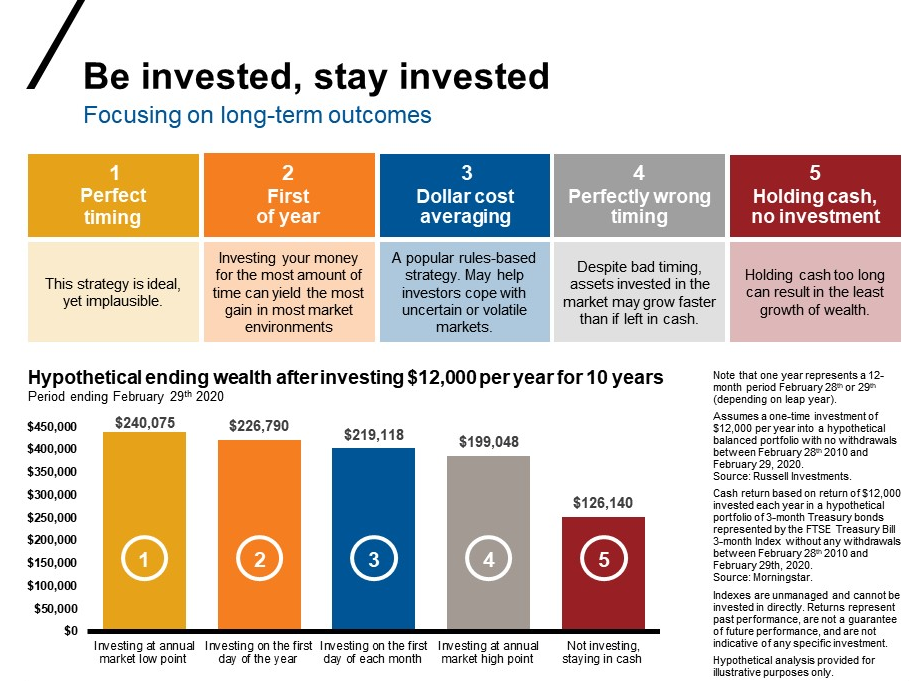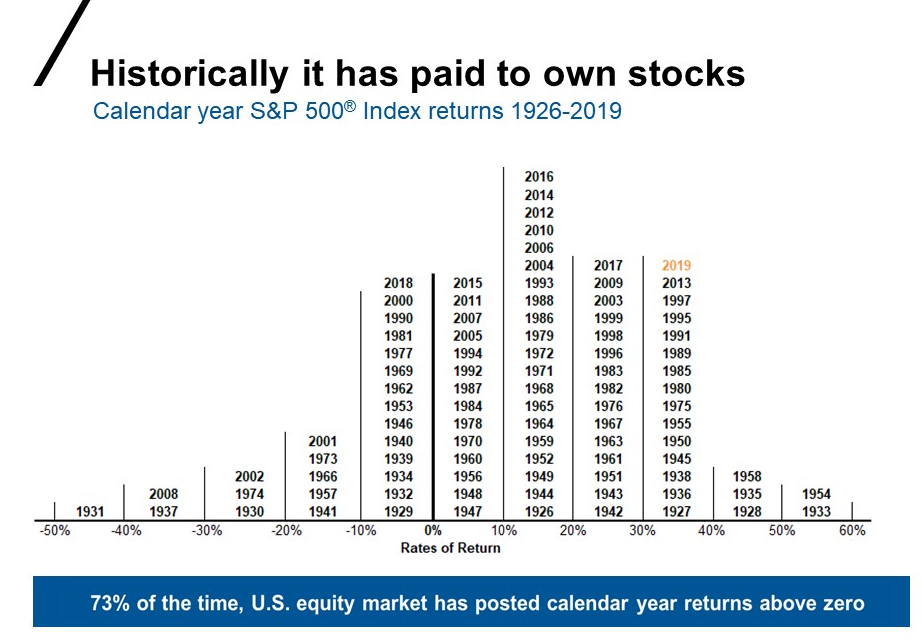Keep calm and keep your clients invested
Investors are faced with headlines every day that inevitably lead to uncomfortable conversations about the importance of not bailing on investments when markets get jittery. Whether it’s a global pandemic, trade war talks or a looming election, headlines inevitably distract investors. We're here to help you with perspective and insight and have provided a downside toolkit to help you navigate through market volatility.
On days where your screen is flashing red and clients are calling in a panic, wondering if it’s time to pull the plug, it’s more crucial than ever to remind them of the bigger picture. At Russell Investments, we believe that your greatest value as an adviser is to act as a behavioural coach, effectively preventing missteps that can lead to bigger shortfalls than investors are already facing. Recent events have served as a reminder of this. Investing can be uncomfortable for a lot of people, but does it have to be?
To help ease some of the angst, here are four general rules to help keep your clients calm and invested.
No one (really) can time the markets
“In the financial markets, hindsight is forever 20/20, but foresight is legally blind. And thus, for most investors, market timing is a practical and emotional impossibility.” - Benjamin Graham, The Intelligent Investor.
Even the most sophisticated of investors will tell you that it is virtually impossible to accurately predict the market’s short-term moves. In fact, mistiming can be disastrous to investment returns. In a low growth/lower return environment, what does this mean for your most vulnerable clients? In today’s reality, where investors are more likely than ever to face retirement income gaps, they can’t afford to miss out on returns.
Remind clients about the power of being invested over the long-term. Not being invested (strategy #5 in the chart below), and simply leaving money in cash, yields by far the worst ending wealth of any investment option. Even investing your money on the worst days of the market (strategy #4) is still more favourable than not investing at all.
Click image to enlarge
Nothing, especially volatility, lasts forever
There have been many times throughout history where markets have pulled back - but these relatively short periods are most often followed by the most favourable returns. Unfortunately, due to loss aversion - one of the principles of behavioural economics - people tend to remember the bad twice as much as the good.1 This means that despite having experienced the longest bull run in history, a few bad days in the markets can cause investors to rethink their long-term investment strategy.
Since 1926, stocks have more often finished the calendar year in positive rather than in negative territory - in fact, 73% of the time, as evidenced in the chart below. It’s extremely challenging to predict whether a calendar year return will be positive or negative. But what is the value of staying invested during uncertainty? Find out through our value of staying invested tool.
Click image to enlarge
Source: Represented by the S&P 500®Index from 1926-2019.
Index returns represent past performance, are not a guarantee of future performance, and are not indicative of any specific investment. Indexes are unmanaged and cannot be invested indirectly.
Shop the sale! Volatility creates opportunity
That luxury sports car you have been saving for and eyeing for months is now 10% off. If you don’t buy it now, you run the risk of never seeing that price tag again. Investing for your clients should be no different. While economic uncertainty will always be a cause for investor anxiety, the resulting market volatility offers the potential to better position portfolios for the longer term.
Markets sometimes become over-exuberant - and prices become excessive, but the opposite is also true. Short-term periods of crisis can push prices artificially low, creating excellent opportunities to buy. Buy low, sell high is an idea that seems simple enough, but why don’t more investors do it? Blame it on the herding mentality.
Diversification matters
“The only investors who shouldn’t diversify are those who are right 100% of the time.” – John Templeton2
Having a robust strategic asset allocation with regular rebalancing can potentially enhance returns, but more importantly, manage volatility. Periods of panic provide an equally good opportunity to check in with clients and ensure that they have the right attitude when it comes to risk.
We believe it’s good to remind clients that asset classes change leadership regularly. Russell Investments has consistently advocated for investors to consider a global multi-asset approach to investing. We believe doing so puts clients on a smoother path toward meeting their goals. Put simply, investors diversify because the future is uncertain, and no one can predict with certainty which asset class will win or lose over the upcoming cycles. If part of your investment strategy involves chasing previous asset class winners, it’s time to stop.
The bottom line
Encouraging clients to take a step back and look at the bigger picture is important. Following the 2008 global financial crisis, we believe the most successful advisers were those who focused on deepening client relationships, not those who focused on maximising investment returns. Be the behavioural coach your clients desperately need when times are hard or uncertain, using our tools to help guide through the cycle of market emotions. They will thank you for it.
1 Source: Seeking Alpha: The Persistence of Aversion: Why Investor Pains Hurts Twice. https://seekingalpha.com/article/4240745-persistence-of-aversion-why-investor-pain-hurts-twice
2 Source: Financial Express: How legendary investor John Templeton learned to put his eggs in different baskets by Sushruth Sunder.
https://www.financialexpress.com/market/how-legendary-investor-john-templeton-learned-to-put-his-eggs-in-different-baskets/847894/
Any opinion expressed is that of Russell Investments, is not a statement of fact, is subject to change and does not constitute investment advice.

